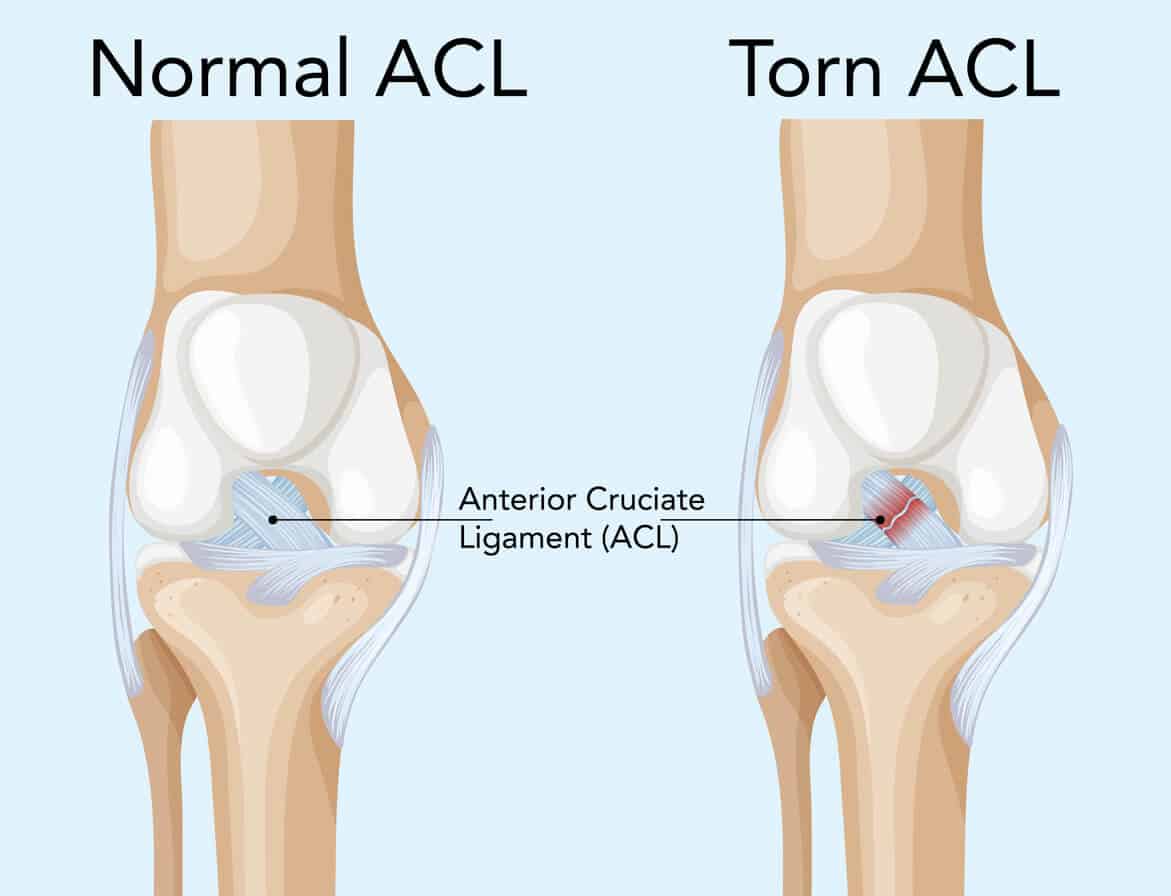Active people face many risks when playing sports or exercising. One of the most serious injuries that can happen is an ACL tear. Athletes with ACL tears often experience sudden, severe pain that stops them from continuing their activity. Understanding the signs and symptoms can help you get treatment quickly and avoid further damage.
Let us explore the signs and symptoms of ACL tears that warrant medical attention.
What Is an ACL Tear
An ACL tear happens when the anterior cruciate ligament in your knee gets damaged. This ligament is about the size of your pinky finger. It sits inside your knee joint and prevents your shinbone from sliding forward.
There are three types of ACL injuries:
- Grade 1 Sprain: The ACL ligament is stretched but not torn.
- Grade 2 Sprain: The ACL ligament is partially torn.
- Grade 3 Sprain: The ACL ligament is completely torn.
Complete tears are the most common type of ACL injury in athletes. These injuries often require surgery to be repaired properly.
Common Causes of ACL Tears
ACL tears usually happen during sports activities. The injury often occurs when an athlete:
- Changes direction quickly while running.
- Lands awkwardly from a jump.
- Stops suddenly while moving fast.
- Gets hit directly on the knee.
Sports with high rates of ACL tears include:
- Football
- Basketball
- Soccer
- Skiing
- Tennis
- Volleyball
Female athletes have a higher risk of ACL tears than male athletes. This difference may be due to anatomy, hormones, or movement patterns.
Immediate Signs of an ACL Tear
When an ACL tear happens, most people notice symptoms right away. The most common immediate signs that active individuals and athletes with ACL tears can notice are:
A Popping Sound
Many people hear or feel a loud pop when their ACL tears. This sound happens when the ligament snaps. Not everyone hears this pop, but it is a strong sign of an ACL injury.
Severe Pain
ACL tears cause intense pain that starts immediately after injury. The pain is usually sharp and makes it hard to continue the activity. Some people describe it as the worst pain they have ever felt.
Inability to Continue Activity
Most athletes with ACL tears cannot keep playing their sport. The pain and instability make it impossible to run, jump, or move normally.
Immediate Swelling
The knee often swells quickly after an ACL tear. This swelling happens because of blood and fluid buildup inside the joint. The swelling can make the knee look much larger than normal.
Symptoms That Develop Over Time
Some signs of an ACL tear become more obvious in the hours and days after the injury:
Knee Instability
The knee may feel loose or unstable. You might feel like your knee is giving way when you try to walk. This instability happens because the ACL is no longer there to keep the knee stable.
Limited Range of Motion
It becomes hard to bend or straighten the knee fully. The swelling and pain make it difficult to move the joint normally.
Tenderness
The knee feels tender to touch, especially along the joint line. Even light pressure can cause pain.
Difficulty Walking
Walking becomes painful and difficult. Many people need crutches or other support to move around.
How ACL Tears Are Diagnosed
If you think you have an ACL tear, you should see a sports medicine doctor right away. The doctor will examine your knee and may order tests to confirm the diagnosis.
Physical Examination
The sports medicine doctor will check your knee for:
- Swelling
- Tenderness
- Range of motion
- Stability
Special tests like the Lachman test help check if the ACL is torn. During this test, the sports medicine moves your shinbone forward while your knee is bent. If the bone moves too much, it suggests an ACL tear.
Imaging Tests
Your sports medicine doctor may order imaging tests to get a better look at your knee:
- X-Rays: These show if there are any broken bones.
- MRI Scan: This test shows soft tissues like ligaments and can confirm an ACL tear.
- CT Scan: This may be used if the sports medicine doctor suspects other injuries.
Treatment Options for ACL Tears
Treatment for ACL tears depends on several factors, including:
- How active you are.
- Your age.
- The severity of the tear.
- Whether other parts of the knee are injured.
Non-Surgical Treatment
Some people with ACL tears can be treated without surgery. This approach works best for:
- Older adults who are less active.
- People who do not play sports.
- Partial tears that may heal on their own.
Non-surgical treatment includes:
- Rest and avoiding activities that cause pain.
- Ice to reduce swelling.
- Compression bandages or braces.
- Elevation of the leg.
- Physical therapy to strengthen the muscles around the knee.
- Anti-inflammatory medications like ibuprofen (Advil) or naproxen (Aleve).
Surgical Treatment
Many athletes with ACL tears need surgery to return to their sport. Surgery is usually recommended for:
- Young, active people.
- Athletes with ACL tears who want to return to sports.
- People whose knee feels very unstable.
- Cases where other parts of the knee are also injured.
ACL reconstruction surgery replaces the torn ligament with a graft. The graft can come from:
- Your own hamstring tendon.
- Your own patellar tendon.
- A donor tendon from someone else.
Recovery from ACL surgery takes six to nine months. Physical therapy is a crucial part of the recovery process.
Treatment for Athletes With ACL Tear in Cary, Holly Springs, and Morrisville, NC
At Cary Orthopaedics, our experienced sports medicine specialists understand how ACL tears affect athletes. We provide comprehensive care from diagnosis through recovery. Our team includes board-certified orthopaedic surgeons who perform hundreds of ACL surgeries each year.
We also provide physical therapy services to help you through every step of your recovery.
For more information, contact us at 919.467.4992. To schedule your appointment, call our office today at 919.573.4825. Our three convenient locations in Cary, Morrisville-RTP, and Holly Springs make it easy to get the expert care you need.
We look forward to serving you!
Sources


